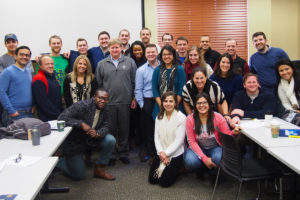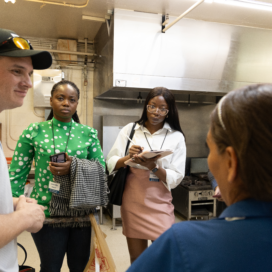Business on the Frontlines: Justin Jones
Published: March 22, 2019 / Author: Katie Rose Quandt
Justin Jones (MBA ’16) always strove to be a force for good in the world, but was never sure how that would look. It all came together for him during his MBA at Notre Dame — in particular, while helping humanitarian aid organization World Vision address child sex trafficking in the Philippines, as part of innovative Notre Dame MBA course Business on the Frontlines (BOTFL).
 “To make the world a better place using the skills that are afforded me as a business professional: That is what drives me at my work now, and I very much want that to be the primary driver of the rest of my career,” said Jones, who works for EY as a manager in advisory services. “Without BOTFL, I wouldn’t have as clear a picture of what that could look like.”
“To make the world a better place using the skills that are afforded me as a business professional: That is what drives me at my work now, and I very much want that to be the primary driver of the rest of my career,” said Jones, who works for EY as a manager in advisory services. “Without BOTFL, I wouldn’t have as clear a picture of what that could look like.”
Jones earned his undergraduate degree from a small religious liberal arts college. He planned to go to law school and become the “lawyer who changed the world.” After living in China for a while among other life experiences, he had a different vision: “I saw the opportunity for business to be that lever of change,” he said.
He chose the Notre Dame MBA because of the network, the flexibility of the program that allowed him to focus on business areas most interesting to him such as social entrepreneurship, and the College’s focus on business as a force for good. When he heard about BOTFL, he saw the course as the embodiment of all of the above.
Sex trafficking in the Philippines is a world apart from management consulting, but Jones said the skills required to analyze each industry carry over, including fact finding, rigorous analysis and problem solving. Before leaving for the Philippines, his interdisciplinary team of three MBA and three international law students extensively studied the problem. They also familiarized themselves with World Vision’s operations, studied economics of developing countries, and discussed common pitfalls in development work.
 On-site in the Philippines, team members spent two weeks in several major cities, interviewing World Vision executives, government officials, and nonprofit organization and business leaders. The group also accompanied World Vision, who had made connections with several groups and organizations working to address trafficking, to meet with sex workers, trafficking victims, pimps, and massage parlor owners.
On-site in the Philippines, team members spent two weeks in several major cities, interviewing World Vision executives, government officials, and nonprofit organization and business leaders. The group also accompanied World Vision, who had made connections with several groups and organizations working to address trafficking, to meet with sex workers, trafficking victims, pimps, and massage parlor owners.
Before traveling to the Philippines, the team members thought they would deliver one or two recommendations to reduce child trafficking, said Jones. But as they gained a deeper understanding of the problem on the ground, their goals shifted.
 “We ended up coming out saying, ‘No one has enough information to even measure whether intervention programs are effective yet,’” said Jones. “The data wasn’t there.” They realized that their job was to help World Vision design a systematic approach to collect the data while piloting interventions, so longer-term investments could be most effective.
“We ended up coming out saying, ‘No one has enough information to even measure whether intervention programs are effective yet,’” said Jones. “The data wasn’t there.” They realized that their job was to help World Vision design a systematic approach to collect the data while piloting interventions, so longer-term investments could be most effective.
“Of course, it would have been great to walk out and say, ‘Hey, we wrote this plan that’s going to have this immediate impact,’” said Jones. “That’s the part of the trip that was the most difficult for me — seeing very, very clearly what was happening, and knowing that I wasn’t going to come up with a solution in two weeks’ time that was going to stop it. The emotional and spiritual toll made it very difficult work.”
But BOTFL staff had prepared team members for the likelihood that the issue would be more complex than anticipated. “To be able to step back and say, this is actually an approach that could make a difference, even if it’s not as immediate as we would like it to be, was absolutely rewarding in its own way,” he said.
Post-graduation, Jones feels drawn toward long-term work that addresses social needs such as human trafficking. He assists the BOTFL program by interviewing applicants and coaching projects. He also came away with a changed worldview. “Many of my classmates held different religious, philosophical, economic, and political worldviews, but we were able to truly learn together and were all changed by the experience,” he said. “I am still in contact with them, and being challenged to revisit my assumptions.”
But perhaps the biggest benefit for Jones, personally, was learning how MBAs can bring a unique and useful perspective to real-world problems. During the preliminary research phase, Jones and a teammate realized they couldn’t address the problem without understanding how it worked. So they mapped out the human trafficking industry’s value chain — the process by which businesses take raw materials and sell a finished product to customers. “The wash of horror that overtook us as we realized we needed to add a product endpoint for a human being became my strongest motivation to succeed,” he said. “But at the same time, the majority of the people who are working on these issues would never think to consider a value chain for this business.”
“And that, I think, is what BOTFL did for me more than anything, to show that the things I’ve learned as an MBA, the tools I have, and the ways I think, that are unique.”




